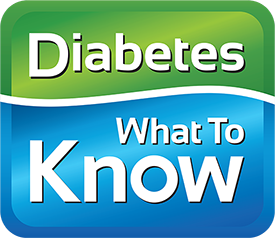By Melinda Maryniuk, MEd, RD, CDCES
When a person with diabetes isn’t feeling well, blood glucose can go high even if they are eating less than they usually do. It is important to have a plan in place so people can be prepared for any kind of day when they’re not feeling their best. Here are examples of situations that are considered a “sick day” and may make blood glucose go up:
- Common cold or flu
- Fever
- Nausea, vomiting, diarrhea
- Infection
- Surgery
- Dental work
- Stress
- Injury
Making a sick day plan.
During times when you feel sick or are in any of the situations listed above, it is important to pay closer attention to glucose levels as they can change unexpectedly and very quickly. It is also wise to take steps to prevent illness if someone in your home is sick, you may want to isolate yourself to reduce the risk of catching any germs or virus. Follow these guidelines and talk with your healthcare provider about a plan specific for you:
- Check blood glucose often. Check it 4 times a day for mild illness (like a cold) or every 3-4 hours for a more severe illness, such as the flu. Blood glucose can rise quickly when you are sick and you cannot always tell what’s happening just by how you are feeling. If glucose is over 250 mg/dl for two readings in a row, call your healthcare provider as you may need a change in your medications.
- Keep your hands clean. Germs carry easily. Avoid the risk of spreading your illness by keeping your hands clean and covering your face well in case of a sneeze or cough.
- Ask your healthcare provider if you need to check ketones. This is always important for people with type 1 diabetes and sometimes recommended for those with type 2. You may need to check if your blood glucose goes above 250 mg/dl.
- Always take your diabetes medicine. When you are not feeling well, you may not feel like eating. However, it is important to keep taking your diabetes medicine (unless your healthcare provider tells you not to).
- Drink plenty of fluids. Drink plenty of water or other fluids throughout the day to prevent dehydration. If you are unable to eat solid food, switch back and forth each hour between sugar-free drinks (water, seltzer, tea, diet soda) and drinks containing carbohydrates (such as juice and regular soda).
- Easy-to-eat foods. When you don’t feel like eating your usual meals, it is still important to get some carbs in to cover the medicines you’ve taken – especially insulin. Keep some special foods handy for a sick day emergency such as plain saltine crackers, oatmeal, broth based soups, applesauce, and lower-sugar popsicles. Talk with a dietitian to determine if you need a special sick day diet plan based on your diabetes medicines.
- Check your diabetes treatment and home-remedy supplies. Make it a habit to keep sugar free cold and cough remedies on hand, as well as fever reducing medicines such as acetaminophen and ibuprofen. Keep your prescriptions refilled so you’re not running short.
- Rest and keep warm. Don’t exercise much. Have someone help take care of you.
- Stay isolated. If you or someone in your home is ill, especially if you’re not sure if it is something contagious, reduce the risk of spreading a virus or germs and minimize interaction.
Know when to call for help.
Never hesitate to call your doctor if you are worried, but pay particular attention to your signs & symptoms and call for advice if you…
- Have signs of dehydration such as dry mouth, cracked lips, sunken eyes, skin that is flushed and dry or weight loss
- Have a fever of 100° or higher
- Are vomiting or unable to keep fluids down
- Have constant diarrhea
- Have chest or abdominal pain
- Have rapid, shallow breathing or shortness of breath
Supplies to have on hand:
- Digital thermometer
- Cough and cold remedies, like cough drops (sugar-free versions)
- Fever reducing medicines (acetaminophen or ibuprofen)
- Home blood pressure monitor
- Extra batteries for your glucose meter
- Extra strips to check blood glucose
- Stocked up on refills of your diabetes medicine
- Broth or light soups (helps replace fluids & electrolytes)
- Easy-to-digest carb foods: applesauce, oatmeal, rice
If you’d like to learn about staying healthy with diabetes, click here.
The medical information on Diabetes – What To Know’s website is provided as an information resource only. The content is not in any way intended to be nor should you rely on it as a substitute for professional medical evaluation, diagnosis, advice and treatment.

